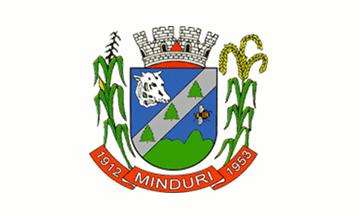 image by
Dirk Schönberger, 6 August 2010
image by
Dirk Schönberger, 6 August 2010Source: adapted from http://www.minduri.mg.gov.br/Cidade/BandeiraBrasao/Bandeirabrasao.htm

Last modified: 2012-03-17 by ian macdonald
Keywords: minas gerais | minduri |
Links: FOTW homepage |
search |
disclaimer and copyright |
write us |
mirrors
 image by
Dirk Schönberger, 6 August 2010
image by
Dirk Schönberger, 6 August 2010
Source:
adapted from
http://www.minduri.mg.gov.br/Cidade/BandeiraBrasao/Bandeirabrasao.htm
A white field with the municipal arms centerd.
Official site at
http://www.minduri.mg.gov.br/
Dirk Schönberger,
6 August 2010
The municipality of Minduri (3,840 inhabitants in 2010; 220 sq. km) is
located in south-southwestern Minas Gerais, 300 km of Belo Horizonte. Minduri
emerged around the railway station of Paiol, built in 1912 by the Central
Western Railways on the Paiol Estate, owned by Homero Penha de Andrade. The
estate was named for the big barn ("paiol") where maize was stored before being
processed in the farm. Homero and his brother Gabriel recommended the engineers
of the railway company to build the station in a place bordered by the small
Melo and Pitangueiras brooks. Huts and shops were built nearby, including seven
houses for the railway employees, of which one has been preserved, as well as
the railway station. In 1934, a commission was set up to obtain the erection of
the district of Paiol, renamed the same year Andradina as a tribute to the
Andrade family. On 17 December 1938, Andradina was renamed Minduri and erected a
district of the municipality of São Vicente de Minas, from which it seceded as a
municipality on 12 December 1953.
The coat of arms of Minduri is "Azure a
bend sinister argent three trees vert in chief a bovine head argent in base a
mountain vert ensigned with a bee argent. The shield surmounted with a mural
crown argent charged with a red triangle. The shield supported dexter by a maize
plant proper and sinister by a rice plant proper. Beneath the shield a scroll
gules inscribed argent '1912 - MINDURI - 1953'."
Green represents the
Forest Region covered with the primary forest. The other colors - red, blue,
white and grey - have been randomly selected. The mural crown represents the
municipality. The red triangle charging it recalls that the municipality belongs
to Minas Gerais that has such a red triangle on its flag. The bovine head
symbolizes dairy cattle. The trees represent the primary forest. The bee alludes
to the namesake of the municipality, Manduri Peak, where lives a bee species
called Manduri*, which means in Tupi "living in the soil". The mountains
represent the relief located in the northern part of the municipality. The
plants supporting the shield are the two main crops in the municipality. The
scroll bears the years "1912" - the year of inauguration of the railway station
of the Central Western Railways, the first historical event that prompted the
development of the settlement of Paiol, and "1953", the year of political and
administrative emancipation granted by State Law No. 1,039 of 12 December 1953.
http://www.minduri.mg.gov.br/Cidade/BandeiraBrasao/Bandeirabrasao.htm -
Municipal website
* Melipona marginata Lepeletier is a South
American stingless bee, of 7 mm in size, living in colonies counting up to 300
members.
http://www.minduri.mg.gov.br/Cidade/Abelha/Abelha.htm - Municipal website
Ivan Sache, 6 February 2012